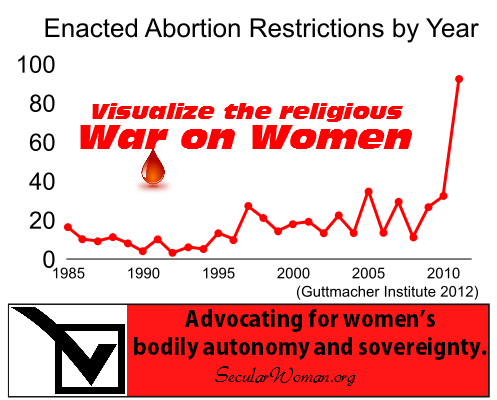To politicize something means to inject politics into a previously politics-free subject. "Politics" in this context can mean several things. At the most straightforward, it means connecting a thing to electoral or legislative issues, e.g. using the Ebola outbreak in West Africa to talk about the US-Mexico border in order to convince people to vote for conservative candidates and endorse conservative immigration laws. However, in many cases "politics" means something broader: while gay marriage and non-discrimination laws are political in the above sense, many issues relating to gender & sexual minorities have nothing to do with the government; yet trans and gay visibility are seen as inherently "political". Similarly, not all feminism is connected to legislative or electoral efforts, but feminism is similarly considered thoroughly political. In this sense "politics" and "political" tend to relate to the presence of conceptions about how the word does or should work; it is either used synonymously with "ideological" or to refer to the praxis of an ideology. With that broader meaning, politicizing something would mean injecting any amount of ideology into something that was previously completely ideology-free.
The problem with this is that nothing relating to human interaction is ideology-free. There are only ideologies we notice, and those we do not; similarly, there are invisible and visible politics, but nothing social that is truly politics-free.
At this point, I should clarify what "invisible" means here. Things can be invisible because they fly below people's radar, are rarely encountered, or are otherwise hidden; that is not what I'm talking about. Here, invisibility comes from ubiquitousness: people don't think they and people like them have an accent (it's all these other people who do) because they're acclimatized to it so that it has become their default[1]; similarly, certain assumptions about the world are defaults, and thus normalized and not perceived as even existing[2]. These base assumptions tend to connect up to form entire "naturalized" (as in: "that's just the way things are naturally/normally") ideologies[3].
Default worldviews are just as ideological or political as others, but their underlying assumptions are not usually noticed, i.e. they are invisible; thus, these worldviews are thought of as objective or purely reality-based. In contrast, any alternative view or critique of the default will have noticeable (or even explicitly stated) base assumptions, and will thus be viewed as biased, subjective, or ideological. The introduction of such a critique or alternative worldview into a particular social space would therefore be seen as "politicization" of that space. As noted though, they already have politics in them, they're just politics of the status quo, as imperceptible to us the same way our own local accent is; or the way the grammar of one's own language is followed without necessarily explicitly knowing its rules (i.e. the way young children use & understand it). Feminist critique of video games does not "politicize" them; they already had male-centered politics in them (and some games are explicitly about ideologies and politics *coughbioshockcough*). Shining a light on homophobia in sports does not politicize sports; they already had the politics of heteronormativity in them. Criticizing racial underrepresentation in STEM is not politicizing academia; it has already been full of white-privileging politics, and quite explicitly so until very recently. And so on.
The invisibility of dominant ideologies also means any attempt at making them visible first faces a lack of language to describe the issues[4], and later is likely to be attacked as making things up and playing the victim. It is somewhat analogous to what it would be like to be the first person ever to try to describe English grammar: one would have to unmask and name features no one previously even considered might exist. Reactions by others might also be similar: being the first to claim there are specific rules, patterns, and structures to something people learn "naturally" and navigate fairly well without ever learning any rules for would likely result in the grammarian being accused of making up conspiracy theories about shadowy English-designing cabals forcing people to speak according to "rules".
Lastly, that only the non-default worldview is even identified as a worldview (rather than objective truth) works to the advantage of currently dominant worldviews. "Politics" and "ideology" are both terms with negative connotations in our society. Consequently, being able to accuse critics of "politicizing" or "injecting their ideology into" some aspect of culture or society without risking the same accusation is a useful weapon in defense of the status quo. Similarly, one can accuse critics of bias or subjectivity while being able to claim objectivity for the dominant perspective. This is how it is possible for men to say that they have an objective outsider perspective on gender-related issues or how conservative Christians can connect their religion to the Republican party while at the same time claiming that Islam is different than Christianity because Islam is a political ideology.
None of these attacks are accurate. All social things already have politics in them; all people are biased, subjective, and political, whether that's in favor of dominant ideology or a different one; no one is an outside observer to racial, gender, class, or other hierarchies; there are always social structures even when you don't know about them (just like your own language has grammar even if you've never learned any). The status quo is politics, and it's important to point this out.
– – –
[1] Esling, J.H. (1998). "Everyone Has an Accent Except Me", in Bauer, L. & Trudgill, P. (Editors). Language Myths, pp.169-175. [book chapter]. New York, NY: Penguin Putnam Inc. Retrieved from here.
[2]Olson, D. (Oct 21, 2014). "S4E7 – #GamerGate", in Folding Ideas. . Retrieved from here, transcript available here.
[3]Wemyss, G. (2009). The Invisible Empire: White Discourse, Tolerance and Belonging. [book]. Surrey, UK: Ashgate Publishing Ltd. p.10. Retrieved from here.
[4]Solnit, R. (Jun 04, 2014). "Language Matters: How #YesAllWomen Named a Problem With No Name", Yes! Magazine. [web]. Retrieved from here.

